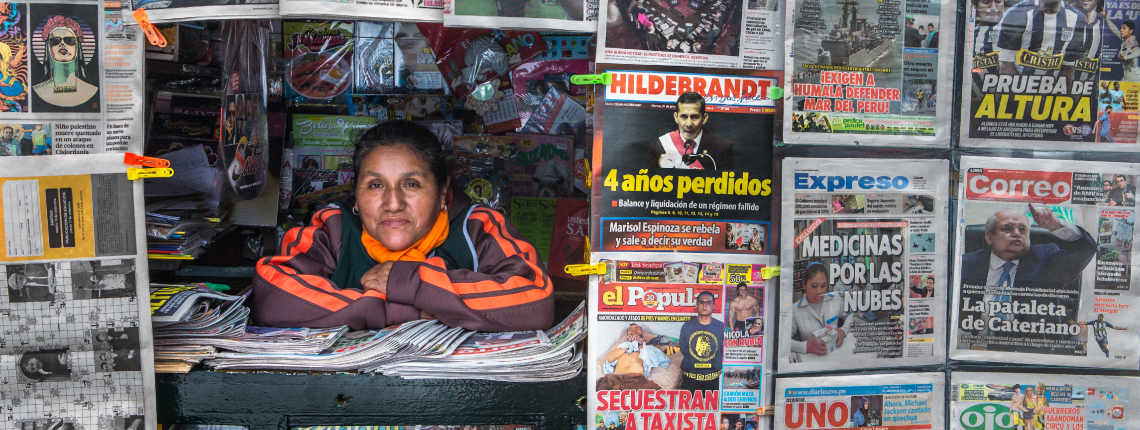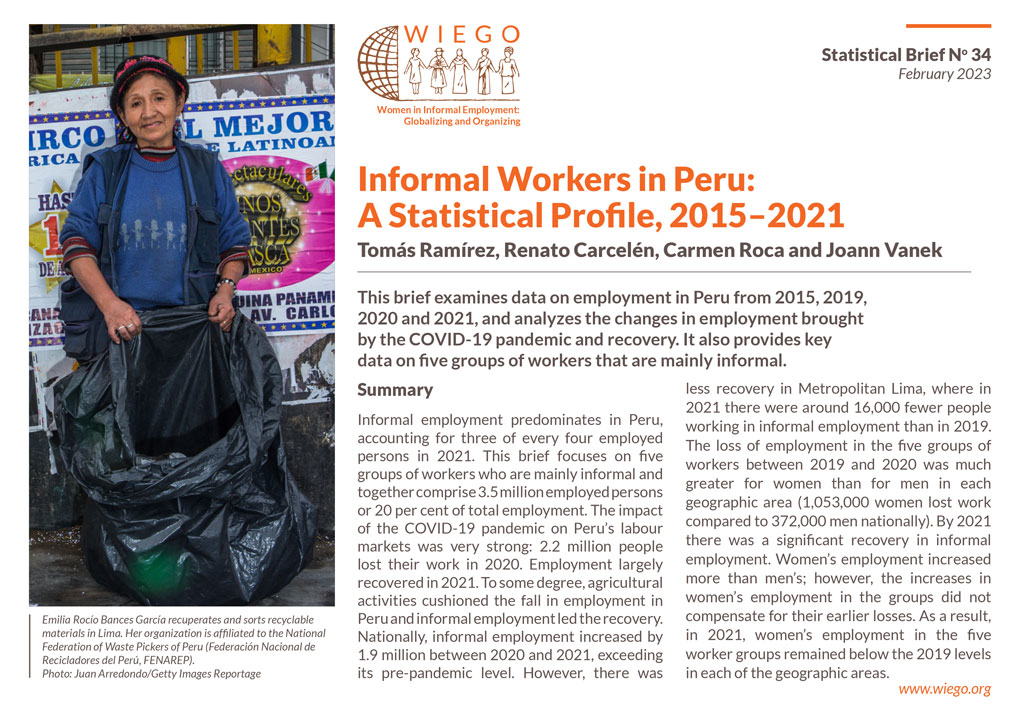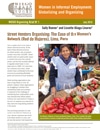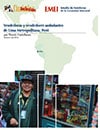
The Work in Lima
Since 2010, WIEGO has implemented several initiatives in Lima, Peru, creating a critical mass of work on informal employment issues. In Lima, WIEGO works with seven sectors of informal workers:
- Street vendors
- Market vendors
- Domestic workers
- Waste pickers
- Newspaper vendors
- Market porters
- Shoe-shiners
Despite the size of the informal economy in this large capital city, informal workers’ issues have not been widely discussed or understood, and informal work has not been reflected in statistics.
Lima teamCarmen Roca Edith Anampa |
WIEGO is working to raise the visibility of informal workers and their representative organizations, and to equip them with research, statistics and findings needed for advocacy and to negotiate with governments.
Since starting work in Lima, WIEGO has engaged in advocacy efforts, together with membership-based organizations (MBOs) of informal workers, for more equitable policies, social benefits and sustained processes for dialogue with city authorities, among other things. Specifically, WIEGO activities in Lima have included:
- Capacity-building with workers in areas such as: policy advocacy, communications, leadership, governance, regulatory and legal frameworks and occupational health and safety.
- Supporting MBOs in engaging in dialogue and negotiations with city and national public officials to provide input on laws, regulations and social policy.
- Supporting MBOs in raising the visibility of their sectors and demands, including through creation of collective platforms of demands for political advocacy and engagement with the media.
What are we working to achieve?
Expanding Networks, collaborative efforts for advocacy
Our efforts in Lima started small but grew continuously due to the interest of MBOs of the sectors mentioned above, and to the opportunities of collective work among them. NGO partners and academics are important allies in our research and policy advocacy activities.
Strengthening informal workers organizations and building capacities
Since 2010 we have witnessed the autonomy in knowledge-based advocacy that worker leaders have gained. This is the result of exposure and capacity building activities held along these years, which have been designed based on needs assessments and on practical experiences. Support to the initiatives of the MBOs, both in internal strengthening and in external policy advocacy, has been a key component of our work in Lima.
Bridging dialogue between workers and government authorities
A critical component of WIEGO’s work in Lima has been bringing to the table relevant government authorities and worker leaders. This has taken place in the format of “Mesas” or boards that focus on a theme or on a worker sector. The Mesas provide the space to share information, and find pathways to solve obstacles and protect the livelihoods and rights of informal workers. They respond to the imperative need of having authorities from different sectors and levels of government working together to achieve real progress for workers.
How does political instability affect informal workers?
The WIEGO team and informal worker MBOs in Lima have had to navigate in political turmoil since 2017. Constant changes in authorities and uncertainty about the near future have become regular. Different strategies have been implemented to surf through unstable scenarios, see a summary here.
Legal empowerment and use of law
Regulation that responds to worker needs in a timely manner is a tool for advocacy and to defend workers’ rights. Although several worker sectors have specific laws that regulate their work, there is still a gap in recognizing the worker status of self employed workers, as well as their rights to own merchandise and working tools that should not be confiscated. Legal training is a continuous activity in Lima that has contributed to the increased autonomy of the MBOs.
Publications and news:
|
WIEGO Statistical Brief No. 34. Informal Workers in Peru: A Statistical Profile, 2015–2021. Ramírez, Tomás, Renato Carcelén, Carmen Roca and Joann Vanek. 2023. |
|
WIEGO Organizing Brief No. 1. Street Vendors Organising: The Case of the Women's Network (Red de Mujeres), in Lima, Peru. Roever, Sally. and Lissette A. Linares. 2010. |
|
Lima, Peru was chosen as one of ten cities for WIEGO’s Informal Economy Monitoring Study (IEMS), an action research initiative that aimed to evaluate the realities, constraints and contributions of informal workers. Top photo: Auria Cantorín owns a newsstand and is a newspaper vendor in Lima, Peru. Credit: Juan Arredondo/Getty Images Reportage. |



